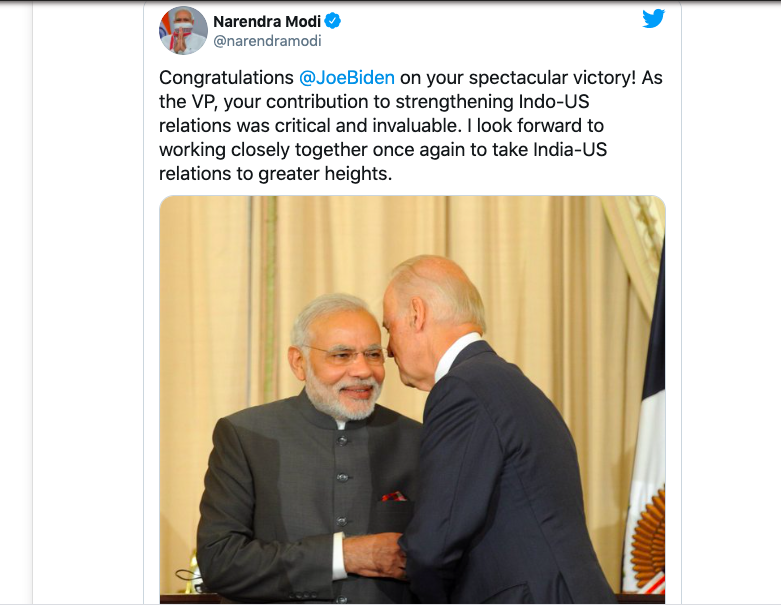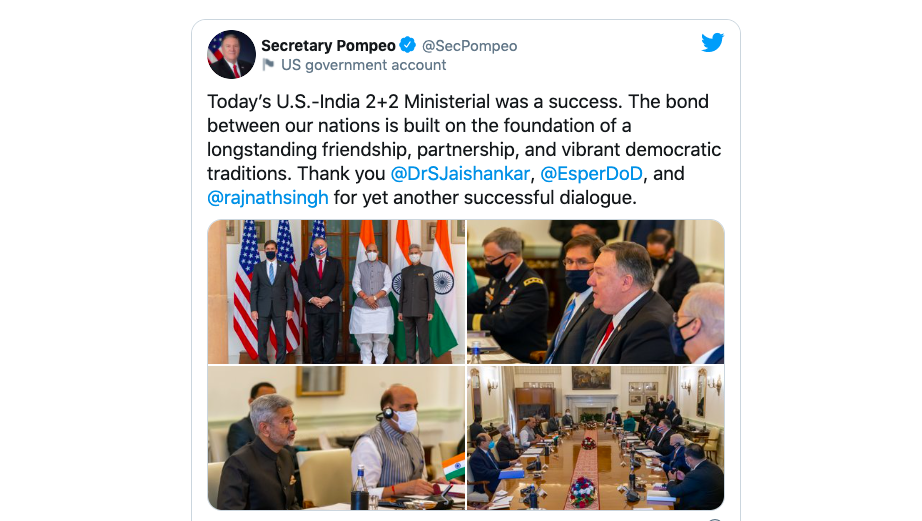Bengaluru, NFAPost: Joe Biden, the 46th president-elect of the United States, brings the victory in the history of US at a time when the world is grappling with Cvoid-19 pandemic and economic uncertainties with new global order and heavy technological disruptions.
Both Prime Minister Narendra Modi President Ram Nath Kovind tweeted congratulatory messages to Biden and expressed their wish to work the new Democrat-led Administration in Washington DC that will assume office in January next year. Both Indian leaders also congratulated Joe Biden’s running mate Kamala Harris, who will make history as the first-ever female, black, Asian American Vice President.

The president elect Joe Biden is making efforts to form a transition team and made first appointment of former surgeon general, Dr. Vivek Murthy, and a former Food and Drug Administration commissioner, David Kessler, as co-chairs of a coronavirus working group. Joe Biden made it clear that taking on Cvodi-19 pandemic is his priority to make an impact on the administration in the US.
Biden senior adviser Ted Kaufman said the transition team will focus on the “nuts and bolts” of building the new administration in coming days. According to Seattle Times report, Joe Biden may not make top Cabinet choices for weeks. But he built his presidential run around bipartisanship and he has spent the days since Tuesday’s election pledging to be a president for all Americans. That suggests he could be willing to appoint some Republicans to high-profile administration positions.
Transition in process
In various dramatic moves for the past three days, Donald Trump has made numerous unsubstantiated claims of electoral fraud as his lead in the battleground states evaporated. It remains to be seen how any legal challenge mounted by him plays out, given that the U.S. Supreme Court is packed with conservative judges.
The second Catholic to be elected president, Joe Biden will have to face key staffing decisions in the days ahead to make head start to his administration. The always-frenzied 10-week transition period before Inauguration Day on January. 20 already has been shortened by the extra time it took to determine the winner of Tuesday’s election.
It is expected that President-elect Joe Biden will deliver a boost to global stock markets and the US and world economy. Although a Biden win was pretty much priced-in by the markets, his victory will eliminate uncertainty – which they loathe – and they will rally further as a result. World is looking at his moves to build equation with China and pan-American interest with its economic allies around the world.
It is a reality that Joe Biden will need to work with the Republican-led Senate to secure fiscal stimulus to bolster the economy. The new president might struggle to get the $3trn wanted by Democrats, but some package is likely. This will buoy the markets and would have investors think about a broader-based economic recovery – rather than a narrower, tech-heavy one.
As the world’s largest economy, sustainable, long-term growth in the U.S. will have a positive ripple effect for the world economy. The reduced chance of massive fiscal stimulus will also mount pressure on the Federal Reserve “to inject further liquidity. In addition, the Joe Biden win without full Senate support means less risk of regulation and higher corporate and personal taxes, which will give more oxygen to the markets and economy.
India and US
The world is looking at America, it needs to lead the world economy in a positive, forward-thinking and smartly way – and at pace. If it doesn’t take pace with new global order, analysts predict that American economic dominance will wane and it will be ultimately replaced by an emerging and fast-growing Asia.
According to Arvian Research, even possible legal challenges from Trump will be dismissed by investors who will instead be focusing on the renewed certainty and stability that a Biden White House will bring, including in key areas such as trade tensions with China, keeping the U.S. in the World Health Organization, resigning the Paris climate agreement, and abiding by other international agreements and long-standing international allies.
“India is also expecting a stable world order working with US in the new century as the centre of gravity is shifting to Asia. By aligning with the US, India wants to board the new digital industrial wave in the world by partnering with lot more US companies and technology institutions,” said Arvian Research.
India is currently the 9th largest trading partner of the US with $92 billion two way goods trade during 2019. The Indin exports were $58.6 billion while imports were $87.4 billion. The U.S. goods and services trade deficit with India was $28.8 billion in 2019.
It is interesting to note that much before he became Vice President in the Barack Obama administration, Joe Biden had advocated a stronger relationship with India. It is heartening to note that Joe Biden played an important role, both as Chairman of the Senate Foreign Relations Committee and later as Vice President, in systematically deepening strategic engagement with India.
But in a recent statistics released by government, there is a major increase in India’s exports to the United States coupled with a decrease in imports during this current year. According to analyst, it is primarily seen due to various initiatives taken by the government led by Prime Minister Narendra Modi.
According to data collected from the Centre, India’s exports to the USA amounted to $5.1 billion in September 2020, 15.5% more than the figures for the corresponding month (USD 4.4 billion) in 2019. In addition, imports from the United States decreased by a substantial 34.3% to $1.8 billion in September 2020, compared to $2.8 billion in September 2019.
The United States and India reaffirmed their defense and security partnership by signing an agreement that would allow New Delhi to access US satellite data crucial for targeting missiles and other military assets. U.S. Secretary of Defense Mark Esper and Indian Defence Minister Rajnath Singh announced the signing of the Basic Exchange and Cooperation Agreement in New Delhi between the two countries paving a new synergy in bilateral relations.

China factor
China’s aggressive posture and US interest in Asia Pacific and its allies have made the relation on tight spot and Joe Biden’s are really looked at for easing this tension. Over the last few few years, it is a reality there has been a realisation in Washington about China’s aggressive behaviour and there is a somewhat bipartisan consensus amongst the Democrats and the Republicans on China as a strategic rival and a threat.
While the Trump administration has been extremely vocal in India’s support in the last six months of the border-stand-off with China, New Delhi will expect a similar approach from the Biden administration as well. One will have to wait and watch if Biden follows the same path, but there could be nuancing of the language and the rhetoric from US officials.
“A Joe Biden Administration will also work with India to support a rules-based and stable Indo-Pacific region in which no country, including China, is able to threaten its neighbours with impunity,” his campaign document says.
Biz and tech world
To take on his mettle for long haul governance, even before securing victory in the presidential election, Joe Biden and his staff reachdc out to tech industry advocates and executives, seeking their input on how his administration should reshape internet and telecommunications policies.
The decision to reach outcomes at a time Big5 companies of America is growing globally and making disruptive governance and technological impact across the globe. There is spiralling animosity among governance circle to take on these Big5, not only in the developed and developing economies but also in the United States.
The outreach from the Joe Biden campaign marks a significant reversal from the past four years, as the Trump administration often sought photo opportunities with industry executives while ignoring their input on key issues such as trade and immigration policies.
For tech industry leaders, the Joe Biden campaign’s early efforts to cultivate them offered hope of a return to more systematic policy formulation, one that is likely to rely on building consensus within the industry. The Trump administration’s policies, in contrast, often appeared to be developed on an ad hoc basis and sometimes seemed designed to hurt companies the president disfavored or benefit those he liked.
Biden is expected to seek sharp breaks with some of Trump’s policies, such as reversing corporate tax cuts. Other policies, such as antitrust enforcement against big tech companies and reform of Section 230, the law that shields tech companies from lawsuits over content posted by their users online, may see some level of continuity between the Trump and Biden administrations. Many industry pundits could see big changes to come under the Joe Biden administration.





